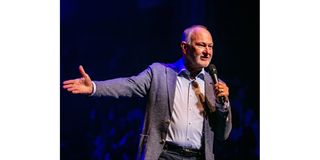Prime
A tribute to Pastor Gary Skinner

Pastor Gary Skinner. PHOTO | COURTESY
What you need to know:
- The story of the Skinners is touching. A clear vision from God: Go to Uganda, plant an English-speaking church in downtown Kampala through which lives would be transformed. He obeyed
Perhaps everyone who is associated with Watoto Church has their own story to tell. Mine begins in the late 1980s, back when it was known as Kampala Pentecostal Church, and it involves the memory of my departed mother.
A devoted Christian who never missed Sunday service, she came to be a member of KPC almost by chance – and with a bit of frustration – after one day her children were removed from the pews of a cathedral in Kampala because, as the ushers told her, the kids were still kids and they weren’t expected to pay tithe.
My mother was told that Sunday that her children could go outside and play. So it was while looking for a new church that she discovered the family-oriented KPC and its principled mzungu pastor who kept time and was beloved among his church members for his kindness. And once she was in she never left, ceasing to be a member when she died in 1994.
Pastor Gary Skinner, Watoto Church’s team leader since its inception in 1984, retired on February 3 in a wonderful event in which he handed over the reins to his long-time protégé, Pastor Julius Rwotlonyo.
For me it’s impossible to think of Skinner without somehow recollecting the memory of my mother, for whom the then-KPC was a home away from home, a place where she could commune with God without having to worry about everything else that she was going through, including failing health and death.
Some Sundays she volunteered as an usher, and the lively praise-and-worship sessions lifted her and gave her hope, and she was always glad when the church organised Sunday school trips. She would tell us at home to get prepared quickly, saying ‘Muzungu keeps time! If you delay, they will leave you’. She also mentioned that Skinner discouraged hopping from one church to another.
The story of the Skinners is touching. A clear vision from God: Go to Uganda, plant an English-speaking church in downtown Kampala through which lives would be transformed. He obeyed. Through the difficult days of military coups, with most foreign nationals leaving, Skinner and his young family stayed.
As the Skinners have said themselves, Uganda at that time was not a place people were running to. Watoto held its first service on Easter Sunday 1984 at the Crystal Suite of Imperial Hotel.
After two years, the church congregation had outgrown the capacity of the hotel, and the search for a bigger home led them to a building called ‘The Centre’ in downtown Kampala that once had been known as the Norman Cinema Hall. What was once a filthy and dilapidated building filled with rodents became a place of prayer and healing, and nothing typifies the church’s excellence more than the launch in the mid-1990s of Watoto Child Care Ministries, a program looking after abandoned children, orphans and vulnerable mothers.
A tour of the children’s villages in central and northern Uganda will leave you mesmerized at what God can do when good people hearken to his voice.
For me, personally, Sunday school at KPC in the early 90s was fun! Some Sunday school songs still ring in my head. I remember being a part of one or other of the many kids’ clubs, including literature and drama. And I remember a Sunday school teacher named Uncle Dayan, a beloved instructor who used his many gifts to simplify Bible stories and who rewarded exemplary kids with praises and sometimes awarded little treasured cards.
After my mother’s death and the family’s relocation to the rural countryside, I didn’t attend the church again until the early 2000s. It was still the same church and Skinner was still there. I entered the KPC building one evening in 2004 and was filled with joy. I was back to the church my mother had introduced me to all those years ago, and this time I didn’t want to be a mere church-goer. I joined a youth choir called ‘Oils of Gladness’ and later joined the main choir in 2006. I was now at university and could decide where I wanted to fellowship, even if my brothers and cousins went elsewhere. I have stayed since.
As Skinner hands over the baton to Rwotlonyo, we celebrate our old pastor and his wife Marilyn for their years of dedication and leadership of Watoto. They have literally practised what they preach, and I can say they have never done or said anything that left me disappointed. My friends feel the same way.
The church’s growth over the decades speaks for itself: over 10 church celebration points in Uganda, one church in the South Sudanese capital of Juba, hundreds of children’s tours telling the world Jesus saves, many children homes/villages where orphans get an education and the dignity of vulnerable mothers is restored, hundreds of student graduations in different disciplines through Watoto, and many other charitable activities. One is therefore compelled to salute the Skinners for these lifetime achievements, and for me, in honouring them, I also pay tribute to a mother who loved them as much.
Ivan Ashaba, Watoto Church member.




